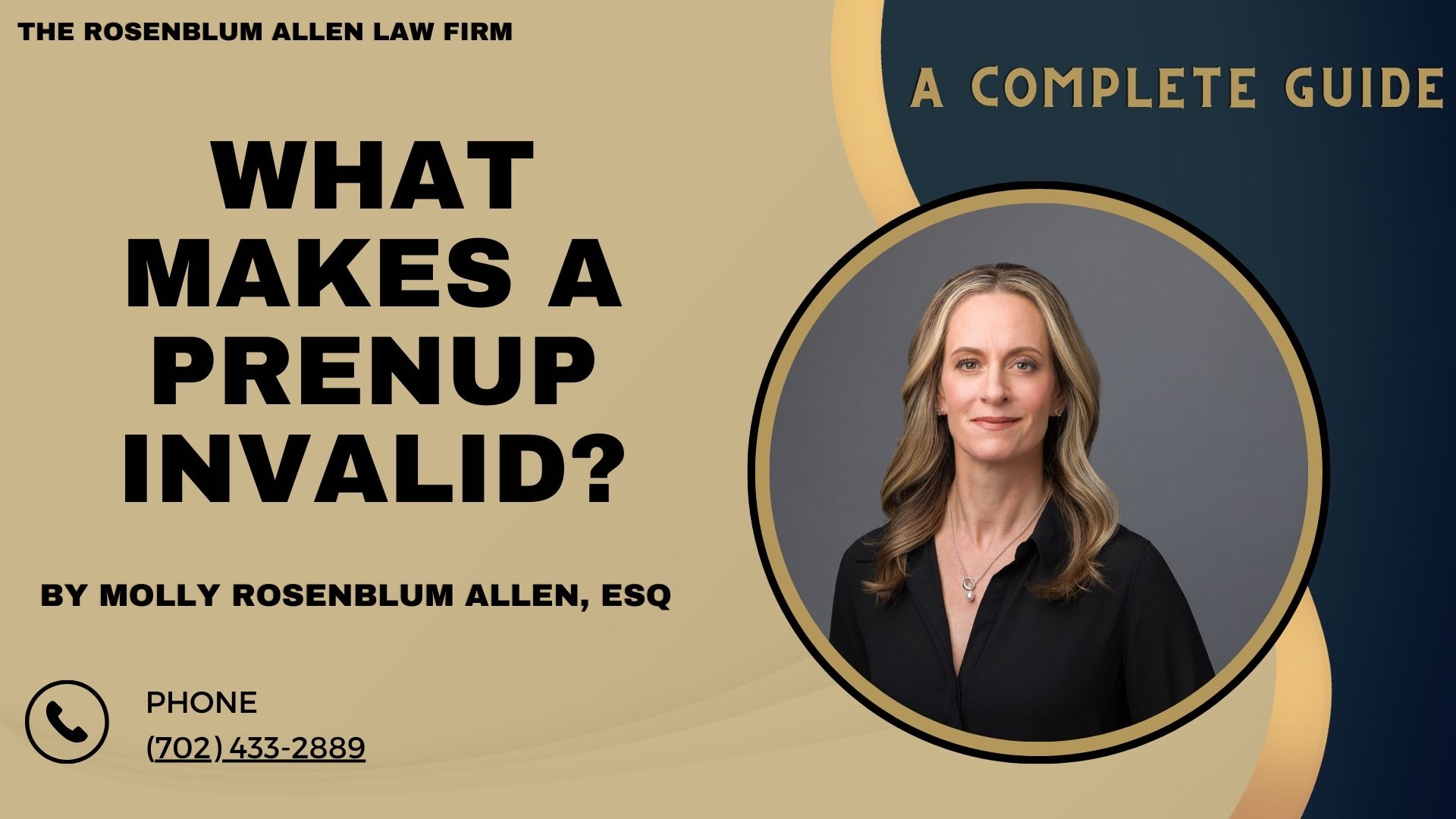Prenuptial agreements, or “prenups” for short, are like roadmaps for marriage. They outline what happens to your finances if your marriage ends. But not all prenups are set in stone. Parties can become chaotic when someone throws out certain items. Let’s break down why a prenup might not hold up in court.
 Key Factors That Can Make a Prenup Invalid
Key Factors That Can Make a Prenup Invalid
Understanding Coercion and Duress
Imagine someone pressuring you to sign a contract. That’s coercion or duress. One partner in prenup terms forced or scared into signing. This could be due to threats or last-minute pressures before the wedding.
Examples of Coercion in Prenup Agreements: Being given a prenup the night before your wedding and told, “Sign this or the wedding is off.”
Legal Threshold for Duress: It’s not just about feeling rushed; it must be shown that there was no natural choice but to sign.
Importance of Independent Legal Advice
Having your lawyer look over a prenup ensures you understand what you’re agreeing to. It’s about making sure both parties know the deal is fair.
Role of Independent Attorneys: They ensure you get a fair shake, explaining the terms and what you might be giving up.

Failure to Disclose Assets Fully and Honestly
Honesty forms the foundation of a prenup. If one person hides assets or lies about their worth, they can void the agreement.
Consequences of Incomplete or Dishonest Asset Disclosure:
Impact on Asset Division: Hidden assets can lead to an unfair division that the court may not enforce.
Legal Ramifications for Dishonesty: Lying in a prenup can lead to legal trouble beyond just the agreement being tossed out.
Requirements for Full Financial Disclosure:
Listing Assets and Liabilities: Everything must be on the table, from bank accounts to debts.
Verification of Financial Information: It’s not just about listing assets; it’s about proving they exist and are valued correctly.
This first look explores why prenups may be invalid. It highlights the need for fairness, honesty, and legal help. In the following sections, we’ll explore why prenups fail and how to avoid these pitfalls.

Understanding What Makes a Prenup Invalid
Unfair Terms
If a prenup seems one-sided, it might not hold up. If the agreement is too unfair to one person, a court might not enforce it.
What Counts as Unfair: If one person gets everything and the other gets little or nothing, that’s unfair.
How Courts Decide: Courts look at the agreement to ensure that both people know what they are signing and that it is fair.
Not Following State Laws
Prenups must follow the law. If they don’t, they might be useless.
State Rules Matter: Each state has its own rules for prenups. Follow these to make a prenup valid.
Standard Requirements: Many states require a witness or notary. Some have waiting periods before getting married.
Invalid Content
Some things can’t be in a prenup, like child custody decisions or illegal agreements.
Off-Limits for Prenups: You can’t decide on child support or include anything illegal.
What Happens to the Rest of the Prenup: Sometimes, only the bad parts are thrown out. But if there are many issues, the whole thing might be at risk.
This approach ensures that every reader can easily understand the key points. They won’t get bogged down by complex legal terms or long explanations.

Making Your Prenup Ironclad
Hire a lawyer who knows the ropes. They make sure your prenup is fair and sticks to the rules.
Why Lawyers Matter: They catch things you might miss and help you understand the legal speak.
Spotting Issues: Good lawyers find problems before they become problems.
Be Open and Honest
Trust starts with transparency. Being transparent about your finances now prevents headaches later.
Sharing Your Financial Picture: List everything you own and owe. No hiding.
Building a Strong Foundation: Honest talks now mean fewer surprises later.
Keep Your Prenup Updated
Change is the only constant. Make sure your prenup keeps pace with your life.
When to Review: After significant life changes or every few years, look at your prenup.
Making Changes: Talk, then act. Discuss changes with your partner and then with your lawyer.
Staying Current with Your Prenup
Life doesn’t stand still, and neither should your prenup. Here’s how to keep it up-to-date:
Life’s Milestones: New job? Inheritance? Check if your prenup needs a tweak.
Regular Check-ins: Even without significant changes, review your prenup now and then to make sure it still fits your life.
Updating Your Prenup: A Step-by-Step
Adjusting your prenup doesn’t have to be a big deal. Here’s how to do it smoothly:
Start with a Chat: What’s changed? How should your prenup reflect that?
Talk to Your Lawyer: They’ll walk you through the legal process of making the changes.
Sign Off on Changes: Just like your original agreement, changes need your signature to be official.
Your prenup is a living document, meant to evolve as your life does. Keeping it updated ensures it always works for you, ready for whatever comes next. This approach keeps things simple. It lets readers quickly grasp how to effectively manage and update their prenup.

Breaking It All Down
Navigating the world of prenuptial agreements can seem daunting at first. But, knowing the common pitfalls can void a prenup. It is the first step to making sure yours is solid and enforceable. A prenup is more than just a legal document. It’s a form of communication between partners. It lays the groundwork for openness and trust in your relationship.
Here’s what to keep in mind to steer clear of invalidating your prenup:
Legal Guidance is Key: Always work with a knowledgeable attorney who can guide you through the drafting process, ensuring your agreement meets legal standards and reflects your intentions.
Honesty is the Best Policy: Full and fair disclosure of assets strengthens your prenup and your relationship.
Adapt as You Go: Life changes, and so might your agreement. Regular reviews and updates can align your prenup with your current situation and future goals.
A good prenup shows mature and thoughtful marriage planning. It gives peace of mind and a clear path forward. With the right prep and mindset, you can build a legal and emotional base. It will support both partners through life’s ups and downs.

Frequently Asked Questions
Can a prenup protect my inheritance?
Yes, a prenup can safeguard your inheritance by stating that any inheritance received before or during the marriage remains yours.
What happens to a prenup if we move to another state after getting married?
Your prenup should still be valid if you move to another state after marriage, but it’s essential to verify with a lawyer in your new state to ensure compliance with local laws.
Can we include child custody and support in our prenup?
No, prenuptial agreements cannot address child custody or support issues. These matters are decided by the court based on the child’s best interests at the time of separation or divorce.
How long does a prenup last?
A prenup typically lasts for the duration of the marriage unless it includes a sunset clause, specifying when it expires, if ever.
Can a prenup be updated or revoked after we’re married?
Yes, prenups can be modified or canceled after marriage, but both parties must agree to the changes or revocation in writing.
Is a prenup valid if it’s not notarized?
The validity of a prenup without notarization depends on state law. Some states require notarization for validity, while others do not.
Does a prenup cover debts acquired during the marriage?
A prenup can address how the couple handles debts incurred during the marriage, whether they are considered separate or marital debt.
What can’t be included in a prenup?
Prenups cannot include provisions regarding child custody or support, personal preferences like chores, or anything illegal. They should focus on financial and property matters.
Can a prenup protect my business?
Yes, a prenup can protect your business by defining it as separate property or detailing how its value will be divided in case of divorce.
If we never end up getting married, is our prenup still valid?
No, a prenup only becomes effective upon legal marriage. If the wedding is called off, the prenup has no legal effect.
Do both partners need their lawyer for a prenup?
While it’s not always legally required, it’s highly recommended that both partners have separate legal representation to ensure understanding and fairness in the agreement.
How soon before our wedding should we sign a prenup?
It’s advisable to finalize the prenup at least 30 days before the wedding to avoid any claims of duress or pressure to sign, which could invalidate the agreement.

Glossary
Asset Disclosure: The process of fully revealing one’s financial assets transparently. This is critical to drafting a prenuptial agreement to ensure fairness and legality.
Coercion is a situation where one party is forced to agree with their will, often under threat or pressure. In the context of prenups, coercion can invalidate the agreement.
Duress: Similar to coercion, duress involves pressure or threats that lead one party to sign a prenup unwillingly. It’s a serious accusation that can render a prenup void.
Financial Disclosure: The act of disclosing one’s financial information, including assets, liabilities, income, and expenses, as part of the prenup process.
Inheritance Protection: A clause within a prenup that ensures any inheritance received by one spouse remains their separate property, not subject to division in case of divorce.
Notarization: The official process by which a notary public certifies a document, such as a prenup, verifying the signers’ identity and willingness to sign the document.
Separate Property: Property owned by one spouse before the marriage or acquired as a gift or inheritance during the marriage, generally not subject to division in a divorce.
Sunset Clause: A provision in a prenup that specifies a time or condition under which the agreement will expire or become invalid.
Unconscionable Terms: Provisions in a prenup that are incredibly unfair or one-sided, which can lead to parts or the entirety of the agreement being invalidated by a court.
Valid Provisions: Terms and conditions within a prenup that are legally enforceable, fair, and within the bounds of the law.
Voluntariness: The principle that both parties must willingly and without undue pressure agree to the terms of the prenup for it to be considered valid.

Additional Resources for You
To further support you during your time of need, our lead attorney, Molly Rosenblum Allen, Esq., has created a suite of resources tailored to a variety of family law matters. Whether you’re navigating the complexities of family court, considering the implications of common law marriage in Nevada, or seeking guidance on a name change in Las Vegas, these resources are designed to assist you:
Las Vegas Family Law Attorneys: Discover comprehensive support for family law cases, including divorce and custody matters. Visit here.
Family Court Las Vegas: Get insight into navigating the family court system in Las Vegas effectively. Learn more.
Common Law Marriage in Nevada: Understand the legal status of common law marriage in Nevada and how it might affect you. Read more.
Name Change Las Vegas: Find out the steps needed to legally change your name in Las Vegas. Explore here.
Nevada Power of Attorney: Learn about the power of attorney process in Nevada and how it can be used in your planning. Check out the details.
How to File a Motion in Family Court: Navigate the process of filing a motion in family court with this guide. See how.
Family Court Mediation: Understand how mediation can be a beneficial alternative in resolving family disputes. Discover the benefits.
Unbundled Attorney: Learn about the advantages of choosing an unbundled legal service for your specific needs. Find out more.
Nevada Adoption: Explore the process of adoption in Nevada, including legal requirements and steps to follow. Read further.
Each of these resources is designed to provide you with the knowledge and tools necessary to navigate your legal journey with confidence. Molly Rosenblum Allen, Esq., and the team at The Rosenblum Allen Law Firm are here to support you every step of the way.

Outside Resources for You
American Bar Association (ABA): A leading national legal organization offering resources on a wide range of legal topics, including family law. Visit the ABA.
National Association of Family Law Attorneys (NAFLA): Provides access to articles, legal resources, and a directory of family law attorneys across the United States. Explore NAFLA.
FindLaw: Offers extensive legal information, including articles on marriage, prenuptial agreements, and divorce, as well as guides to hiring attorneys. Check out FindLaw.
Avvo: Features legal advice, detailed articles, and questions answered by attorneys on family law and other legal issues, plus lawyer directories. Learn more at Avvo.
Nolo: Known for do-it-yourself legal guides and articles, Nolo provides in-depth information on prenuptial agreements and family law. Visit Nolo.
American Academy of Matrimonial Lawyers (AAML): A resource for finding highly skilled family law practitioners and for accessing family law resources. Explore the AAML.
Justia: Offers free legal information on a wide array of topics, including family law, and provides a directory of lawyers by practice area and location. Check out Justia.

A Special Message from Our Lead Attorney, Molly Rosenblum Allen, Esq

Thank you for taking the time to explore our resources. I hope you found the information helpful. It should help you navigate your current situation. Remember, knowing your options is the first step. It helps you make informed decisions about your future.
If you’re ready to take the next steps or have case questions, my team and I at The Rosenblum Allen Law Firm are here to help. You can reach us at (702) 433-2889 to discuss how we can assist you further.
Looking forward to helping you move forward,
Molly Rosenblum Allen, Esq.



